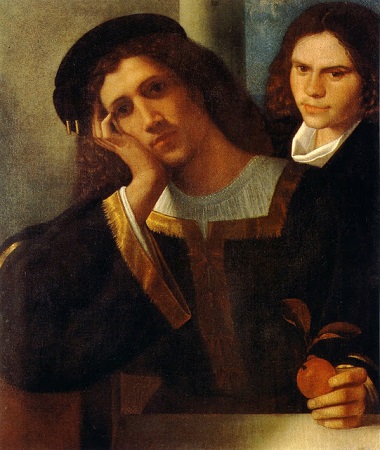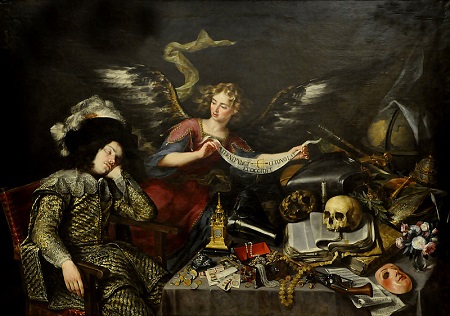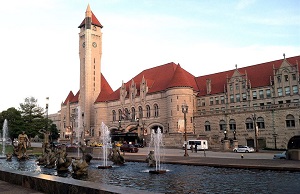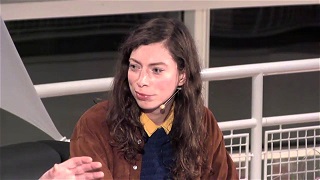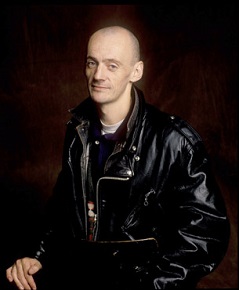De zwarte Amerikaans abolitionist, schrijver, redacteur, publicist, politicus en hervormer Frederick Douglass werd geboren nabij Easton in de staat Maryland op 14 februari 1818 als Frederick Augustus Washington Bailey, (Zijn precieze geboortedag is nooit opgeschreven, maar hij koos 14 februari om het te vieren.) Hij was de zoon van Harriet Bailey, een slaaf. Hij spendeerde zijn jongste jaren in een hut met zijn grootmoeder Betsey, zijn moeder werd op een andere boerderij te werk gesteld waardoor hij haar zelden zag. Op de plantages waar hij opgroeide kwam hij in aanraking met de gruwelijke behandeling van de slaven. In 1826 werd hij naar Baltimore gestuurd, waar hij voor de zoon van de familie, Tommy, moest zorgen. Tommy’s moeder, Sophia Auld, gaf hem lees- en schrijfles maar zij stopte daarmee toen haar man het verbood. Hierna leerde hij het heimelijk zichzelf waarna hij kranten en boeken begon te lezen en hij zich een mening vormde over de slavernij. In 1833 werd hij naar een plantage in Maryland overgeplaatst waar hij in het geheim zijn medeslaven leerde de Bijbel te lezen. In september 1838 ontsnapte hij aan de slavernij. Eenmaal in New York liet hij Anna Murray overkomen, een vrije Afro-Amerikaanse vrouw die hij in 1837 had ontmoet. Zij trouwden en kregen vijf kinderen. Vervolgens ging hij naar New Bedford in Massachusetts, waar hij opnieuw in de havens werkte maar nu voor zichzelf. Hier veranderde hij zijn naam in Frederick Douglass. In 1841 sprak Douglass over zijn ervaringen als een slaaf tijdens een bijeenkomst van de Massachusetts Anti-Slavery Society. Prominente abolitionisten raakten onder de indruk van zijn verhaal en hem werd gevraagd om als spreker op te treden tijdens bijeenkomsten. Hij schreef ook een autobiografie die in 1845 werd gepubliceerd, “The Narrative of the Life of Frederick Douglass, An American Slave, Written by Himself”. Het was een onmiddellijk succes en het verkocht uiteindelijk meer dan 30.000 stuks in de Verenigde Staten en Groot-Brittannië. Het werd ook vertaald in het Frans, Duits en Nederlands. Douglass had echter door zijn boek zijn eigen leven in gevaar gebracht en was gedwongen naar Europa te vluchten om te voorkomen dat hij gearresteerd zou worden. In 1845 verliet hij de VS en begon aan een reeks toespraken in Engeland, Schotland en Ierland. Tijdens deze 20 maanden werd er door anti-slavernijaanhangers in Engeland geld bij elkaar gebracht om zijn vrijheid af te kopen. Ook verdiende hij genoeg geld om zijn eigen anti-slavernijkrant te beginnen toen hij in de VS terugkwam. Na de burgeroorlog bekleedde Douglass een aantal belangrijke politieke posities. In 1872 werd Douglass de eerste Amerikaan van Afrikaanse afkomst om een nominatie te krijgen voor vicepresident van de Verenigde Staten. In 1877 werd hij gekozen als United States Marshal. In 1881 werd hij Recorder of Deeds voor het District of Columbia. Douglas wordt gezien als een van de invloedrijkste schrijvers en sprekers uit de Amerikaanse geschiedenis.
Uit: My Bondage and My Freedom
“In Talbot county, Eastern Shore, Maryland, near Easton, the county town of that county, there is a small district of country, thinly populated, and remarkable for nothing that I know of more than for the worn-out, sandy, desert-like appearance of its soil, the general dilapidation of its farms and fences, the indigent and spiritless character of ist inhabitants, and the prevalence of ague and fever.
The name of this singularly unpromising and truly famine stricken district is Tuckahoe, a name well known to all Marylanders, black and white. It was given to this section of country probably, at the first,
merely in derision; or it may possibly have been applied to it, as I have heard, because some one of its earlier inhabitants had been guilty of the petty meanness of stealing a hoe–or taking a hoe that did not
belong to him. Eastern Shore men usually pronounce the word took, as tuck; Took-a-hoe, therefore, is, in Maryland parlance, Tuckahoe. But, whatever may have been its origin–and about this I will not be positive–that name has stuck to the district in question; and it is seldom mentioned but with contempt and derision, on account of the barrenness of its soil, and the ignorance, indolence, and poverty of its
people. Decay and ruin are everywhere visible, and the thin population of the place would have quitted it long ago, but for the Choptank river, which runs through it, from which they take abundance of shad and herring, and plenty of ague and fever.
It was in this dull, flat, and unthrifty district, or neighborhood, surrounded by a white population of the lowest order, indolent and drunken to a proverb, and among slaves, who seemed to ask, _“Oh! what’s
the use?”every time they lifted a hoe, that I –without any fault of mine was born, and spent the first years of my childhood.
The reader will pardon so much about the place of my birth, on the score that it is always a fact of some importance to know where a man is born, if, indeed, it be important to know anything about him. In regard to the time_ of my birth, I cannot be as definite as I have been respecting the place. Nor, indeed, can I impart much knowledge concerning my parents. Genealogical trees do not flourish among slaves. A person of some consequence here in the north, sometimes designated father, is literally abolished in slave law and slave practice. It is only once in a while that an exception is found to this statement. I never met with a slave who could tell me how old he was. Few slave-mothers know anything of the months of the year, nor of the days of the month. They keep no family records, with marriages, births, and deaths.”
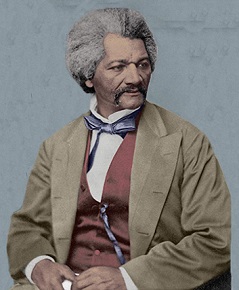
Frederick Douglass (14 februari 1818 – 20 februari 1895)
